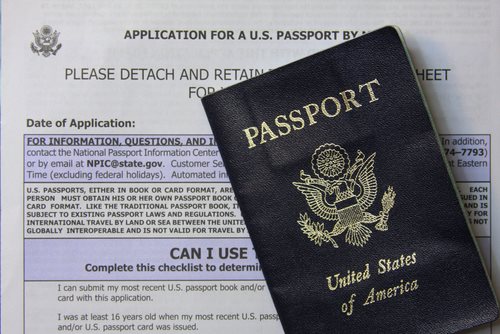
The United States Embassy: A Powerful Diplomatic Presence
The United States Embassy is a vital presence for the United States Government in the international community. It is an American diplomatic mission that operates in foreign countries, with the purpose of promoting U.S. interests and policies. The embassy is staffed by diplomats and other personnel who work to build and maintain relationships with the host country and its government, as well as to provide essential consular services to American citizens abroad. Let’s take a closer look at what makes the U.S. Embassy such a powerful force in international diplomacy.
What is the United States Embassy?
The United States Embassy is one of the primary ways in which the U.S. Government communicates with foreign governments and the international community. It is typically situated in the capital city of the host country, and serves as the official residence and workplace of the American Ambassador to that country. The Embassy may also have a Consulate that provides a range of non-immigrant and immigrant visa services, as well as assistance to U.S. citizens abroad.
The U.S. Embassy is responsible for a wide range of activities, such as promoting U.S. foreign policy goals, fostering economic and cultural relations, and advocating for American values and interests. Diplomats at the Embassy work tirelessly to build relationships with foreign governments and NGOs, facilitate trade and investment, and protect the rights of American citizens abroad.
The Role of the U.S. Ambassador
The U.S. Ambassador to a foreign country is the highest ranking American diplomat in that country, responsible for representing the United States Government, overseeing the operations of the Embassy, and fostering a positive relationship with the host government. The Ambassador acts as the official representative of the President of the United States in that country, and is supported by a highly skilled team of diplomats, administrative and security personnel.
The role of an ambassador can be highly stressful and demanding, as they must deal with a range of political, diplomatic, and social issues affecting the relationship between the two countries. The Ambassador serves as the principal mediator between the governments of the United States and the host country. They must maintain a productive working relationship with key officials from the host country’s government, represent U.S. interests across a range of issues, and work to build strong relationships with civil society organizations and other stakeholders.
The Importance of Diplomatic Engagement
Diplomatic engagement is a key component of the U.S. Embassy’s mission. By engaging with foreign governments and NGOs, American diplomats are able to promote U.S. interests on a range of issues, including human rights, trade, investment, security, and democracy promotion. Diplomatic engagement can involve anything from close communication between the Ambassadors or their staff to negotiating key treaties or agreements beneficial to the U.S. and the host country.
The U.S. Embassy can also serve as a valuable point of contact for other U.S. Government agencies, such as the Department of Commerce, the Department of Agriculture, or the Department of Defense. By leveraging the Embassy’s diplomatic channels and networks, these agencies can more effectively promote American imperatives and policies.
Consular Services
In addition to diplomatic engagement, another primary function of the U.S. Embassy is to provide a range of consular services to American citizens abroad. These services can include emergency assistance, such as medical care or help resolving a financial or legal issue. Additionally, the Embassy may provide assistance to Americans who have lost their passports, or who need to obtain a new passport or travel visa.
Consular services also include promoting trade and economic development opportunities between U.S.-based businesses and foreign businesses operating in the host country. The Embassy can help business owners connect with local partners, navigate local regulations and customs, and develop effective marketing strategies for their products and services. By doing so, the Embassy is able to promote U.S. business interests while also contributing to the economic growth and prosperity of the host country.
Security and Safety
Finally, the U.S. Embassy has an important role to play in promoting the safety and security of American citizens abroad. This includes working with the host government to provide adequate security measures for embassy personnel and their families, as well as coordinating with local law enforcement agencies to protect U.S. citizens and interests.
With the growing threat of terrorism and violent extremism, the security of the U.S. Embassy is a top priority. The Embassy works closely with the local law enforcement and intelligence community to protect against potential threats and to promote secure and stable environments for Embassy personnel and visitors.
Conclusion
In summary, the United States Embassy is a vital representative of the U.S. Government in the international community. Through diplomatic engagement, consular services, and promoting American values and interests, Embassy personnel work tirelessly to promote U.S. foreign policy goals, and foster productive relationships with foreign governments and NGOs. The U.S. Embassy is truly a powerful diplomatic presence abroad.
What is an Embassy?
An embassy is a permanent diplomatic mission located in a country’s capital city. An embassy is responsible for representing the home country overseas and preserving the rights of citizens abroad. An ambassador is the highest office in the embassy. Their job is to be the “voice” of the home nation. Once a nation is declared sovereign by another an embassy is usually established in the capitol of the recognizing nation to maintain foreign relations.
What does an embassy do?
The functions of an embassy deal strictly with that of governmental communication. The embassy’s main job is to represent the visiting nation in the host nation, protecting the visiting nation’s interests, negotiating with the host nation and reporting that information to the visiting nation.
What is the difference between an embassy and a consulate?
Where an embassy deals mostly with international diplomacy between the host and visiting nation a consulate is more concerned with dealing with individual and business relations. As defined by the Vienna Convention on Consular Relations of 1963 a consular has two jobs; (1) to protect the interests of their countrymen in the host country and (2) further the commercial and economic relations between the two countries.
What can I get done at an embassy or consulate?
The most common thing that individuals use the embassy for is to obtain visas and/or passports. For any type of travel outside your home country it is important that you obtain a passport, if not a visa.
What is the difference between a passport and a visa?
A visa is a document showing that an individual is authorized to enter into a country. Unlike common belief, a visa does not allow entry into another country; it merely allows the host country to identify the individual prior to their entry into the country. It may be revoked by the host country at any time. There are many types of visas available including work visas, transit visas, tourist visas, business visas, etc. A visa is usually a stamp that is found within a passport.
A passport, on the other hand, is a document that certifies an individual’s identity and citizenship. Unlike a visa, a passport is your home countries notification that you are permitted to travel outside the country. The passport serves two purposes; (1) to regain entry to the country of citizenship and (2) is a requirement of many countries to gain entry to the visiting country.
How do I get a visa or passport?
The best way to obtain a visa is to visit your local consulate or embassy of the country you wish to travel to. There you will need to fill out certain forms depending on what type of visa you are seeking. Check with the consulate or embassy of the nation you intend to visit to discover what their visa requirements are. There are many countries, especially for U.S. citizens that do not require a visa to travel, only a passport.


















